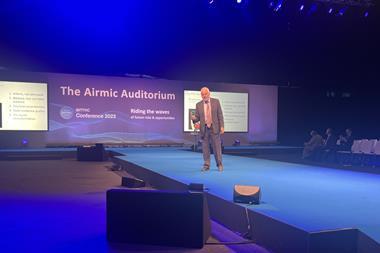LC: How did you get into risk management?
AC: I'm a bio-sciences graduate but I didn't want to become an academic, nor did I really want to work in an office, sitting at a desk all the time. I saw advertisements for science graduates to train as fire surveyors, and I went to work for what was then GRE. The work was mainly insurance related, dealing with the underwriters, but it did involve risk management.
Then I moved to Sedgwick, one of the big brokers that eventually became part of Marsh. It was primarily a loss control role, but it brought me into risk financing, captive management and so on, from a loss control perspective. About ten years ago, I went to Sainsbury as its first risk manager; the business had only had an insurer buyer before. I was there for about eight years and became more involved with business risk and corporate governance issues as we responded to initiatives like Turnbull.
A couple of years ago, I was headhunted by Colt Telecommunications for what is a broader risk management role, where the majority of the work is business risk and corporate governance.
LC: How did you get involved in AIRMIC?
AC: I've been a risk manager for 10-11 years, but I have been involved in risk management for the whole of my career. At Sedgwick, I used to attend AIRMIC conferences as a supplier. Then when I was at Sainsbury, I became a member and I helped revive and then chair the retailers' special interest group.
LC: How does a risk manager balance the demands of the day job with the desire to contribute to AIRMIC?
AC: It isn't an easy balance. An association like AIRMIC could take up as much time as you wanted. But if you believe that an organisation needs to evolve and you have a vision for change, you have to give it a reasonable amount of time.
LC: What are these changes you'd like to see?
AC: There are two aspects. We don't orient clearly enough around business risk, and so it is difficult for us to be seen as champions of business risk management. I'm in complete agreement with the chairman, Nick Chown, here. Also, I would like to see AIRMIC become a focal point for risk management, and not just for risk managers. This is an important distinction. We need to be seen by government, commerce and industry as the voice of risk management.
It's a progressive approach, making sure that we are both trying to keep people on board and growing with a diverse constituency. One way we can do that is by working with the Institute of Risk Management (IRM), which can accept anyone who is involved with risk management.
I'm a supporter of the affiliate member scheme AIRMIC has introduced, which should also help in this area, but it has been seen as somewhat divisive and controversial. I'd prefer to work with all those who want to contribute to the risk management debate, in informal structures if necessary.



















